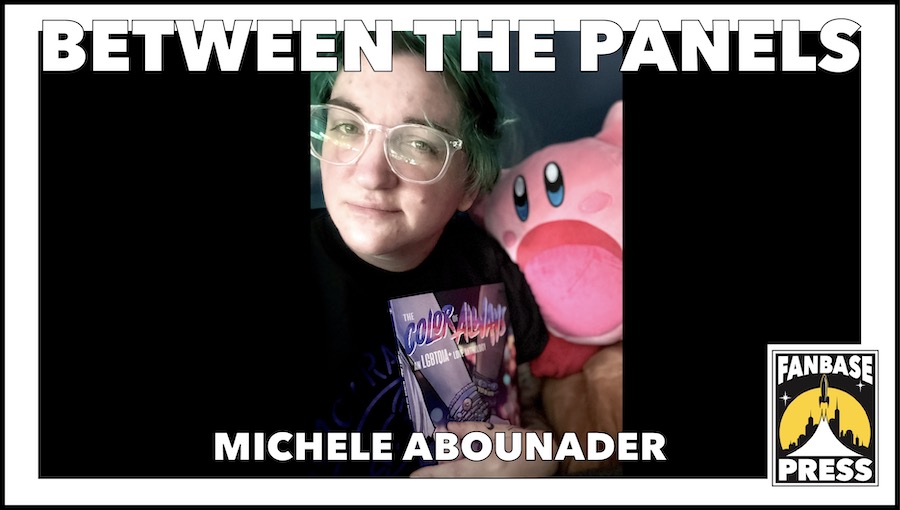“Between the Panels” is a bi-weekly interview series focusing on comic book creators of all experience levels, seeking to examine not just what each individual creates, but how they go about creating it.
For someone who was looking in at the world of comics from the outside, wanting to be part of it, Michele Abounader has certainly made up for any lost time. Between editing several anthologies — and also writing for a few of them — Michele is a creator who has chosen to associate with projects that bring new voices and unique stories into a crowded marketplace.
First off, the basics…
Your specialties (artist/writer/letterer/inker/etc.): Writer/Editor
Your home: Hudson Valley, NY
Website: cerealpancake.com
Social Media
Twitter: @cerealpancake
Instagram: @ilikepancakes
Bluesky: @cerealpancake
Fanbase Press Contributor Kevin Sharp: What does the comics medium offer you as a creator that keeps you coming back project after project?
Michele Abounader: I’m relatively new to working in comics in comparison to some other creators which I will readily admit. I’ve always loved art and poetry and short stories. I think a lot of comics creators are former theater students; I think it’s just sort of a weird overlap. I did theater in grade school and high school. Got involved in ‘zine making, newspapers, things like that in high school, but in ways that were a little more abstract. I never really did serious reporting; I was more into making up news, Onion style, and telling stories with the ‘zine format. I guess that’s kind of where it started. Then, I went to college for creative writing and got super burned out. I think a lot of people that go to school for something creative lose what they loved about it, because you stop learning how to do what you love and you learn how to do what your professors want to critique in a positive way. And since art is so subjective, that can kind of kill your desire to make things that feel authentic to you. So, for the longest time, I didn’t really create much of anything. I dabbled a little bit in photography. And consuming media — watching a lot of TV, movies, reading.
KS: Were comics a part of that media you consumed?
MA: I did read comics when I was younger, and I kind of got away from it because in my brain it was always: This is the superhero stuff I used to read. Like Generation X. My sister and I used to pick that book up all the time. So, I kind of fell off from it and then, I don’t know, five or six years ago I went to a comic shop to pick up a book ‘cause I saw an article about it on Twitter, I think. And it was like, “I should check out a comic book. That sounds fun. I should do this for myself.” I literally went to Google Maps and just typed in “comic book store.” It’s a shop that’s no longer open in New Jersey. But I went in and there were women working, which I thought was great, because you can go to a comic shop and it can be a little daunting and a little gatekeeping. But the people working were so encouraging and had such great conversations with me, recommended great books to me. And I started to see that this is a new way of storytelling that I really wasn’t aware of before. Sort of non-superhero comic book storytelling, and I really just fell in love with it.
KS: Can you recall the titles you saw at the time?
MA: There was a Xena book that I picked up, Erica Schultz’s run. The Wilds. Heathen by Natasha Alterici is one of my favorites. Heathen was one of the first books that I really got into and was, like, obsessed with. It made me sort of feel like maybe I could tell stories again. Maybe this is a way that I could fall in love with being creative again. Because I really lost it. I lost every fiber of creativity that I had. My spark was super gone and starting to read comics really brought it back for me, and for a few years I just kind of soaked it all in. I continued to get my pull box and just sort of enjoy things. I really just started to love stories again.
KS: If your exposure to the medium was more limited when you were younger, what were some of the other things that really fed your soul? Before the burnout period…
MA: I grew up in upstate New York, really far upstate, like near Syracuse. Middle of nowhere. I loved Disney when I was a kid. Who didn’t? Really into Star Wars. Big Princess Leia fan — oh look, women can have guns. Loved Indiana Jones. Xena. I mean, I’m just listing gay things now. I got super into Lord of the Rings. I think everybody who’s my age all kind of were really into the original trilogy there. Any of the animated films by Don Bluth — Secret of NIMH, An American Tail, Land Before Time. All this depressing stuff that really set me up for all the sad stuff I make now. I really think we can blame Don Bluth. [laughter]
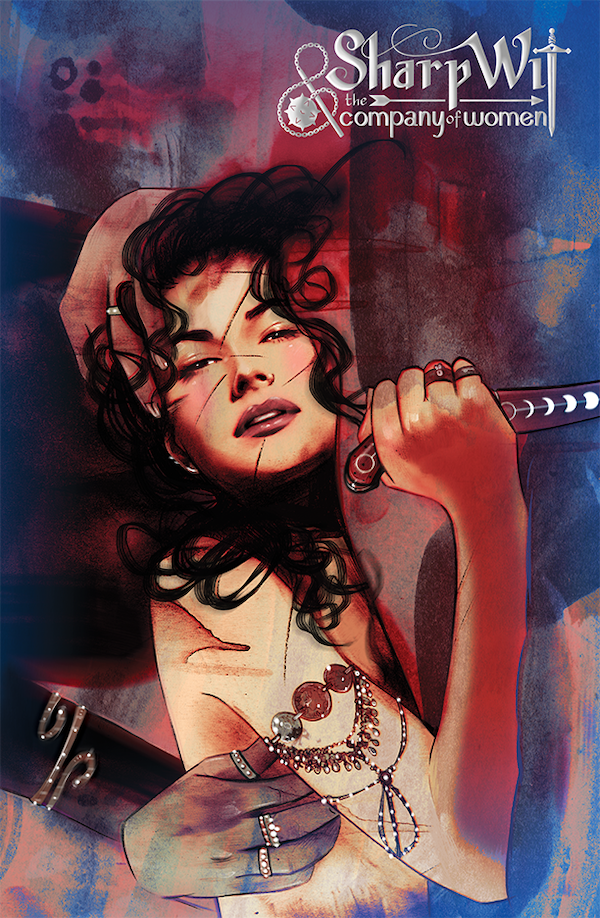
KS: How about you as a creator? When did you get serious about writing as your passion?
MA: There’s a joke that there’s no bond stronger than that of a gay kid and their English teacher. And that rings very true. I was really into creative writing when I was in my high school years, and really into poetry. I continue to be really into poetry — my people call it my “little Emily Dickinson problem.” I continue to write a lot of poetry and I did when I was younger, and I wrote a lot of very strange short stories about feelings that I didn’t understand as a kid. I was very closeted, very afraid, very unsure of who I was. I think a lot of my writing from high school, which I have in a shoebox, is very interesting to look back on because it’s just very confused. I think it’s easy to put stuff on a page when you’re being kind of abstract about it. I’m very fortunate to have had teachers when I was younger that were really encouraging. I would venture to say that my English teacher in high school was probably better than any of the professors that I had in college, in terms of encouraging me to find my own voice.
KS: What was that college writing experience like?
MA: I don’t want to say that nothing that I wrote in college was worth anything. I did have some teachers that were very encouraging and very good, but that doesn’t save you from those that squash you. And when you’re in your early twenties and you have no idea who you are and you’re not feeling encouraged, it’s easier to just burn out.
KS: Can you look back over your work — the pre-professional days — and pinpoint a project you completed that you were especially proud of? Not necessarily comics-related, just anything that felt like a serious accomplishment at the time.
MA: When I was 18, we had to do daily journaling and I was very dramatic. Like most 18-year-old girls, I felt like everything hurt and everything was terrible and I was in love with everyone and no one was right. I wrote poetry and I turned in a pile of poetry as my project — “Here’s my literary journal.” I used to write solely on yellow legal pads. I’d get my yellow legal pad out and I would fold it in half, so it was like a notebook that would fit in the pocket of my giant jeans. I went through my yellow legal pads and I typed up all of my poems. I was feeling, again, very Emily Dickinson inspired. I numbered things like in her poetry collections; it’s all just numbers because she didn’t title anything. So, I was like, I don’t need a title. She didn’t need a title. I was particularly proud of handing in my pile of really dramatic poetry. I still have it. It’s in a shoebox. One of those poems is actually in The Color of Always. It’s my acknowledgement in the back of that book. So, Easter egg!
KS: Before you even arrived on campus to start your writing major, I’m wondering what the family or the home support system was like for that academic path. Did you have any kind of “art is a hobby but your major should be something reliable” conversations?
MA: Well, I pulled the old switcheroo. I was not a poetry major when I got to college, but about a month later I was. Originally, it was some sort of marketing communications. I didn’t know what I was gonna do with it. I told my mom I was figuring it out. I was figuring out a lot of things in college, and none of them were marketing and communications. [laughter]
KS: Here’s a hypothetical for you. As we’re sitting here right now, I’m designating you the kind of college creative writing teacher you would have wanted to have, and Michele from freshman year comes to your class. What’s a piece of guidance you would give her about her work? It could be something holistic or it could literally be writing mechanics.
MA: I actually think about this a lot, because I’ve talked to younger people who are interested in writing since I started my career in comics. The thing that I would’ve told myself is something that I don’t think is a super happy bit of advice. It’s not to major in what you love, because of how much it hurt me to do that. I feel like I lost a lot of time. I do feel like I’m in the right place now and I’m happy that I’ve arrived at this place of comics creation, but if I have any regrets, I regret that I lost such a chunk of time where I was creating nothing. I’ll never get that back. So, I think I would encourage younger me to, I don’t know, try to like math a little bit more, and take some electives for creative writing just to meet other people who love what you love and make stuff together.
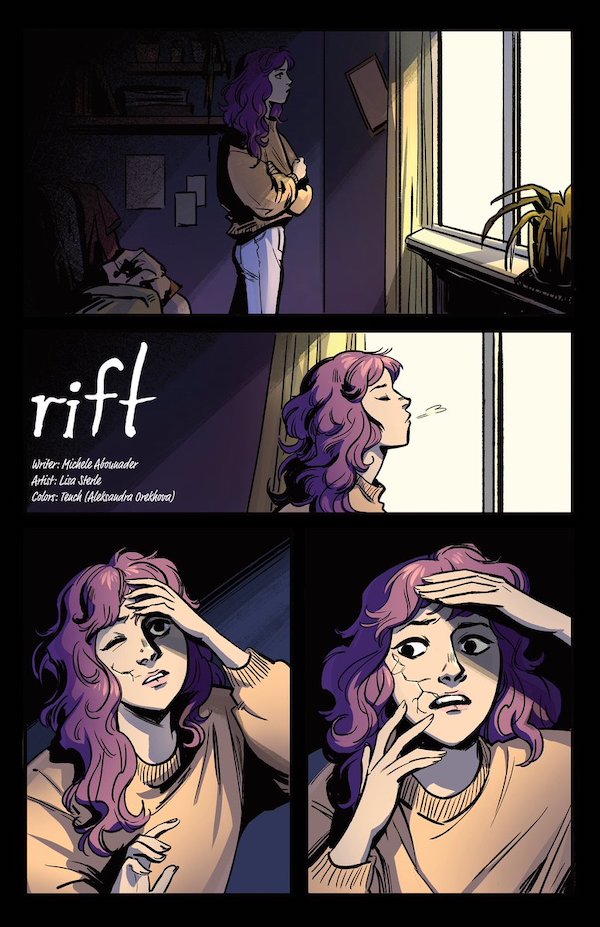
KS: Where does your enjoyment of editing fit into the picture?
MA: It was always about making something. I used to put together my newspapers and my little zines and make my little collections. It wasn’t always about doing the writing. Yes, I write, but I love the creation process. I love to have my hands in all the pies and make the thing. In college, we did a literary magazine once a year and it would get printed on campus. I was on the editorial team for that; I loved making a book. But something that I didn’t really think about when I was younger was, unless you want to move to New York City and make zero dollars, you’re not gonna work in publishing. I think that part of my burnout came from giving up what I actually wanted.
KS: Would trying to crack the traditional publishing world have been any sort of realistic option back then?
MA: I had a lot going on in my personal life when I was 21, 22. There was no way that I [had] the emotional or financial support to uproot myself and live in New York City, which is damn near impossible for anyone at any given time, let alone somebody who is 20, 21, 22 years old with no financial support from their family — or no sugar daddy. Unfortunately. I feel like that would solve a lot of my problems. Maybe that’s the advice to her.
KS: Realizing that path was impossible, what did you envision as far as where a writing major would lead you?
MA: I was young and it didn’t matter. On a personal level, like I said, there was a bit of a struggle there. I was really starting to settle in to like figuring out that part of me when I was getting out of college, so I wasn’t really thinking about “What am I gonna do with my degree?” I was thinking, “Where at the mall can I work so I can still go to the bar and hang out and try to talk to people who are like me?” Something that we talk about in the queer community a lot is that when you come out, you’re kind of like a teenager again, right? When I was 15, I wasn’t really 15 because I was terrified. I didn’t really experience things the way that a lot of kids might experience them in that I wasn’t, you know, talking to my crush at school and seeing if we could go to the dance together — I was doing that when I was in my early twenties. So, I wasn’t really thinking about my future, I was thinking about figuring out my brain and how to exist on this planet as myself. How to find that acceptance, both self-acceptance and acceptance from my friends and family. I don’t regret that. I mean, I am who I am because of the found family that I fell into when I got out of college. I’m still close with quite a few of those people, and I think we’ll be family forever because we kind of fell into each other at a time when we needed support.
KS: You mentioned that you had this creative dry spell and then you found comics again. What kind of time frame are we talking from that rediscovery as a reader to you realizing you wanted to try making them? Months? Years?
MA: A few years. The first comic script I ever wrote is the story “All That Glitters” in Color of Always. I knew I wanted to try to write comics. I had been reading comic scripts to sort of get a feel for the formatting, because I could see the stories, right? I could see what I wanted to write, and I was meeting artists and seeing the way that they created stuff. And just from reading comics and watching other people make them, it felt like it was the right thing. I was just waiting for the right moment. Originally, I was just going to work on Color of Always in an editorial capacity, because that’s what I’ve always been interested in doing. Then, I had an idea and I wrote it and sent it off to Brent [Fisher], and they were like, “No, this is good actually.” It’s difficult to say this without it sounding kind of shitty. I don’t have an ego, I don’t think that I’m great at anything, really. But you have this feeling when you get it right, when you get the right line written down, when you draw something perfect, where you know it’s good.
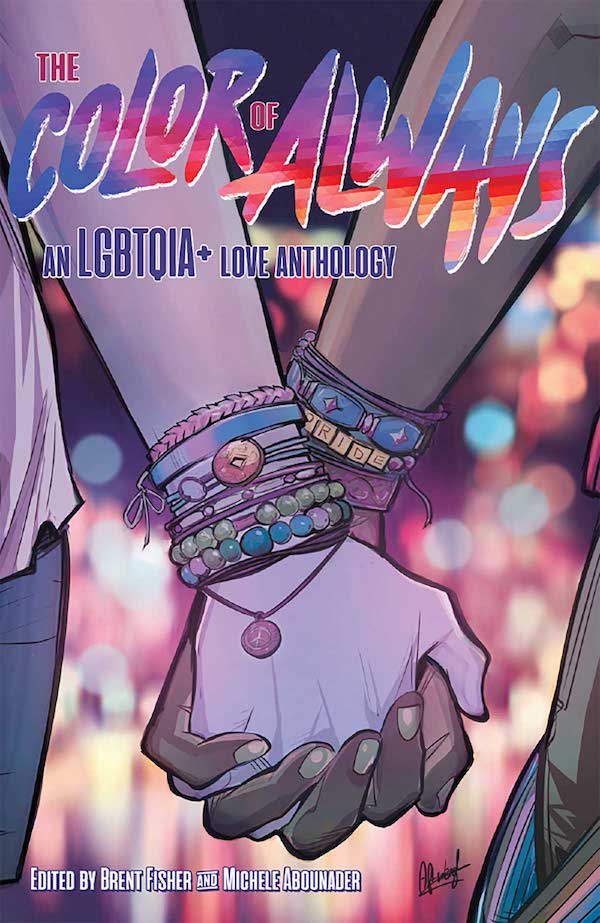
KS: To back up a step, how did you start off as an editor on this anthology when you weren’t already established in comics?
MA: I met Brent through a Discord server. We started this in, like, 2020. I offered to help ‘cause I know how to make stuff and I can make a thing. It’s all the same sourcing—you’re talking to factories, you’re talking to your printer. I have a remedial understanding of graphic design and Adobe products and I can do a layout. I might have to do anything. That’s fine. I don’t think any of us really knew what we were doing, but I think we saw other people making anthologies. I back a lot of Kickstarters because I love to support independent creators, so I have piles and piles of these anthologies that I’ve bought from other people, and I see them and I’m like, Wow, I love that they did this. I’m learning about how they’re telling stories and seeing in my head how I might do it differently, how I like these elements. I like the way this looks and the way that this structure flows. And I loved the message behind it. It sort of started off like, “Oh, we can make a gay book that’s fun.” And it kind of turned into, let’s find people in the community that wanna tell their stories and let’s help because we can. I love to help people who remind me a little bit of myself and, and that lost kid that loved to create but didn’t know what to do with it.
KS: How was the collaborative process for you as a writer? You aren’t a “one-person band” anymore when there’s an artist involved.
MA: I love the story that I wrote. It pulled directly from my experience. It felt really good to find an artist, Tench, who is a great friend to me. She’s also an incredible talent and one of the best people. I’m so grateful for her friendship and her artwork and her understanding of my stories. She’s an incredible collaborator, and I’m so happy that that story is in the book. It’s connected with a lot of people. It’s amazing to reach an audience of people who were me when I was a kid, who are picking up this book and seeing these stories they can relate to and hopefully find something in themselves. I had a handful [of artists submit] that I really liked and then I really thought about it in terms of their portfolios and what I wanted the story to look like. It wasn’t necessarily that this handful of people are the best artists I’ve ever seen, right? It was like, this is a handful of people where I feel like their style would complement the writing. I’m very lucky that the person that I wanted on my story the most said yes, and I could not be more grateful.
KS: Let’s switch to some quick hitters in the time we have left. Thoughts on playing music while you work?
MA: For me that’s a double-edged sword. I like soundtracks while I’m writing. Unfortunately, I like to listen to the same song on repeat for like 24 hours sometimes, so I know all the words and I know all the little vocal inflections. I know everything. It’s difficult for me to write when I’m listening to music that I know the words to, because I will just start writing the lyrics. I do listen to music with lyrics to put myself in like a place to get into like the character’s head. I have playlists for my original characters. I will be like, It’s time to get really sad. And I put that playlist on and I just lie on the ground and feel my feelings. Then, I turn the music off and put my noise-canceling headphones on and write with silence. I pregame with music.
KS: Do you work in any kind of self-imposed writing structure, like completed pages per day, number of words, time at the keyboard?
MA: I can’t force myself to write a lot of the time. I wake up at 3:00 in the morning and I’m writing on my Google Docs app on my phone. I’m writing dialogue while I’m stopped at a stop light in a voice note. I’m pulling over on a highway rest stop to quickly make some notes. It happens when it happens and I can’t force it, unfortunately. Sometimes, I write for days, and, sometimes, I don’t write for weeks. Part of something I learned from my burnout is that I don’t force myself to write when I’m not in the place to do it. That has really helped me get back into wanting to write again.
KS: How about a shout-out to anyone anywhere along your comics journey who was especially helpful to you in some way. A professional contact, a guardian angel, you choose.
MA: Liana Kangas is just the best. They have always been so encouraging of all of my projects and have been super kind to me and to everyone I’ve ever seen them interact with. Honestly, I would absolutely not be doing what I’m doing without them and their support and encouragement. I don’t know that I could shout out anybody else in this situation.
KS: We could probably spend the rest of our time together praising Liana, but instead I’ll hit you with another hypothetical: I can hook you up to a machine, Matrix-style, and you can become an instant expert in any skill you choose. What is something you’d love to be able to do that you can’t currently?
MA: Drawing. I love art and I used to do [it] when I was younger, painting and drawing. I have so much respect and admiration for people who have incredible skill with art ‘cause it really takes talent, but it takes a drive that I did not have to get to a level where it’s amazing. I’m always so blown away by the people that I get to work with, and I look through pages of these books that I work on and I can’t believe it. I can’t believe it’s mine, you know? What the heck? Who am I? This can’t be me.
KS: Please give us a title that you feel represents the comics medium at its very best. What is your nominee as the top of the top of this artform?
MA: I already mentioned Heathen, I would be remiss to not say it again. That first Ms. Marvel run by G Willow Wilson. I love her writing a lot, and I love that book a lot. If I could sneak a third one, DC Future State: Immortal Wonder Woman. I cried so hard reading that book. There was just something about the way that book was written, and the art, that I was really moved by it. I would make jokes on Twitter about how I had a “cry copy.” I had to buy two copies of it because the one I was reading, I was openly weeping on and my tears were ruining the pages.
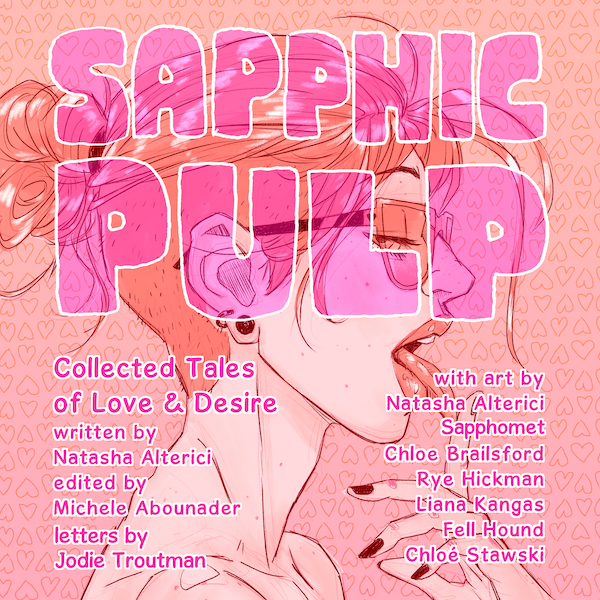
KS: Finally, you mentioned The Color of Always, but is there anything else you’d like to direct readers to that you have out now or have coming out in 2023?
MA: I’m editing Sapphic Pulp, an anthology of Sapphic, erotic comics written by Heathen creator Natasha Alterici — sapphicpulpcomic.com.
[For more information on Sapphic Pulp, you can check out the Kickstarter campaign here.]
This interview was edited for length.

